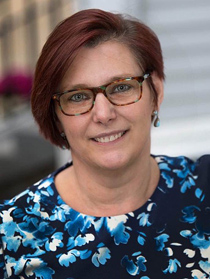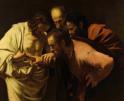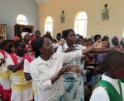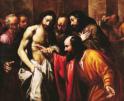
Faith
So why all this turmoil and division over what kind of liturgy we can and ought to attend? I'd suggest it's because there are too few unicorns, too few parishes that are intentional and attentive about all things liturgical.

Wolfe
Most of our family calls them "unicorns." That's because parishes that prioritize offering the liturgy in a way that is uplifting and beautiful are so rare, you may be tempted to think that they are merely mythical and do not actually exist.
Unicorn parishes aren't always found where you expect them, that is, in well-heeled suburban communities where more than just a handful of car radios are tuned to the classical music station on FM. Their pastors don't always wear cassocks, or read printed out homilies, or speak English as their native language. Their choirs don't always sound like angels, and when you leave Mass, you may not feel as if you've attended a "quality production." But you do feel like you've prayed. More significantly, you leave with a deeper conviction that there is, in fact, Someone to pray to, and that this Someone is and wants to be a full, active, and conscious participant in your life.
Unicorn parishes celebrate the Novus Ordo, the Traditional Latin Mass, and the Divine Liturgy. They respond in Latin, English, Spanish, Arabic, and Ukrainian. They chant the propers, sing Black spirituals and favorite hymns, and listen to choral masterpieces. They play organs and saxophones, and yes, even guitars. They receive the Body, Blood, Soul, and Divinity of Christ in Holy Communion in the hand, on the tongue, and on their knees. They pray in tongues with hands raised, in words they learned as children, with incense, and in silence.
So why all this turmoil and division over what kind of liturgy we can and ought to attend? I'd suggest it's because there are too few unicorns, too few parishes that are intentional and attentive about all things liturgical. And there are reasons for that. In most parishes, the struggle to provide for basic sacramental, pastoral, and educational needs means that there's little time to invest in how we offer Mass. Diligent priests are at least as exhausted as lazy ones are. And many simply do not know how to do more than the minimum required. As a result, relatively few ordinary Catholics have been exposed to the richness of Catholic liturgical tradition.
I'm a Novus Ordo Catholic. But I understand what people -- including many young families -- are finding when they attend the Traditional Latin Mass. First, they are being given the liturgy attentively and in fullness. Things like the propers are not skipped because the clock is ticking or for some other arbitrary "pastoral" reason. Any extra rites available for seasons and solemnities are relished rather than removed. Periods of silence are integrated into the Mass. Music is well-prepared and directed to God. Priests actively lead worship. The congregations, though growing, have been small enough to build genuine Christian communities. Many offer real opportunities to get to know each other, often over substantially more time than it takes to down half a cup of coffee and a stale donut. Briefly, there's a significantly higher percentage of unicorns among parishes that offer the Traditional Latin Mass than there are among standard issue Novus Ordo parishes.
But that can change. I hope it does in my lifetime. The quality of our Mass really doesn't depend on which liturgical tradition is being offered. I hope that priests in all facets of our diverse and wonderfully rich Catholic Church wake up one morning and decide that good enough just isn't, that maybe more really is more, and that good liturgy is worth the effort. I pray that someday, most won't just say the black and do the red, but say all the black and do all the red, and whatever else it takes to offer the Mass in fullness. I relish the possibility of all Catholics leaving Mass knowing that worship is why they were there in the first place. Unity and diversity can do more than co-exist; they can fuel each other. And unicorns, if we breed them, can multiply.
- Jaymie Stuart Wolfe is a Catholic convert, wife, and mother of eight. Inspired by the spirituality of St. Francis de Sales, she is an author, speaker, and musician, and provides freelance editorial services to numerous publishers and authors as the principal of One More Basket. Find Jaymie on Facebook or follow her on Twitter @YouFeedThem.
Recent articles in the Faith & Family section
-
Wounds, not scarsJaymie Stuart Wolfe
-
A special collection in the liturgy libraryFather Robert M. O'Grady
-
Witness to a Transfiguration in KenyaMichele Miers
-
Understanding the ScripturesScott Hahn
-
'Cabrini' does extraordinary job of bringing saint to lifeBishop Nicholas DiMarzio


















